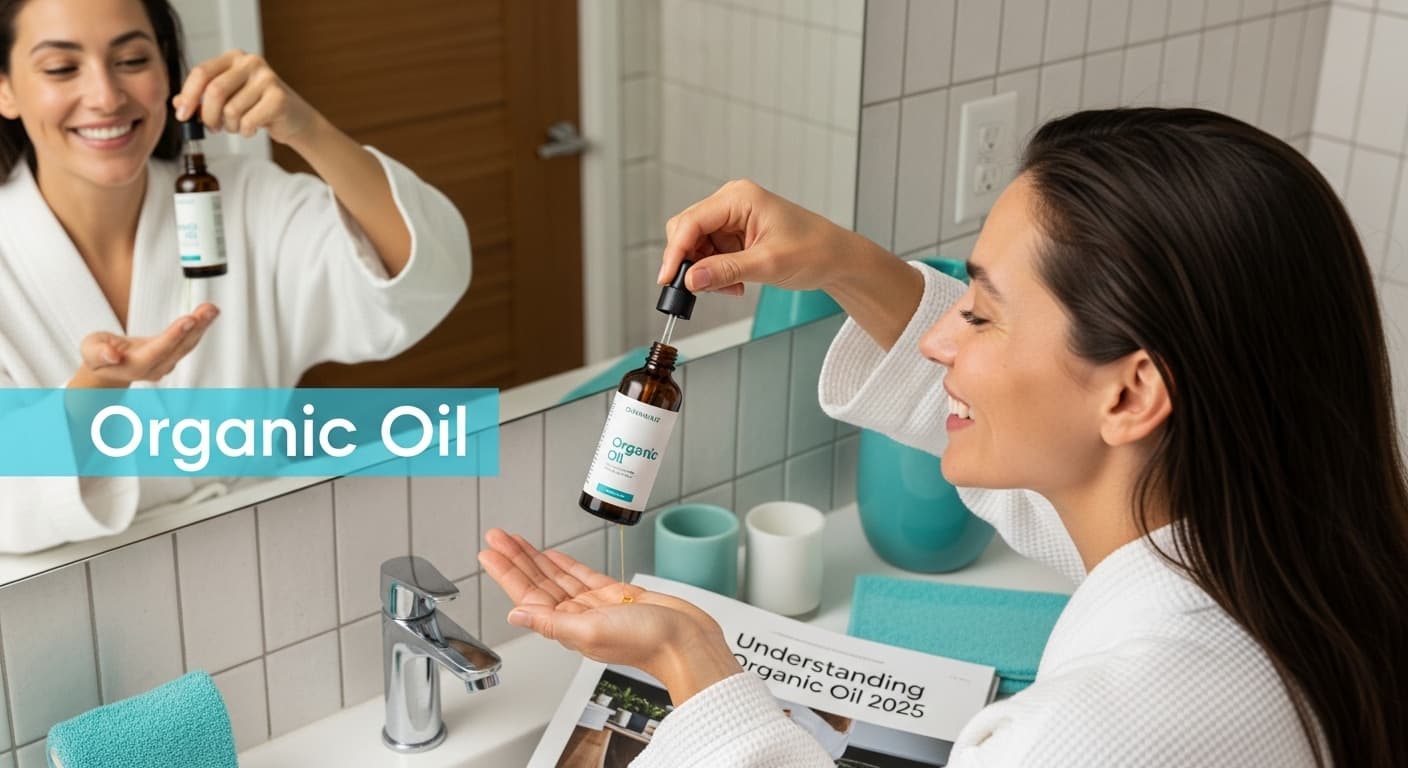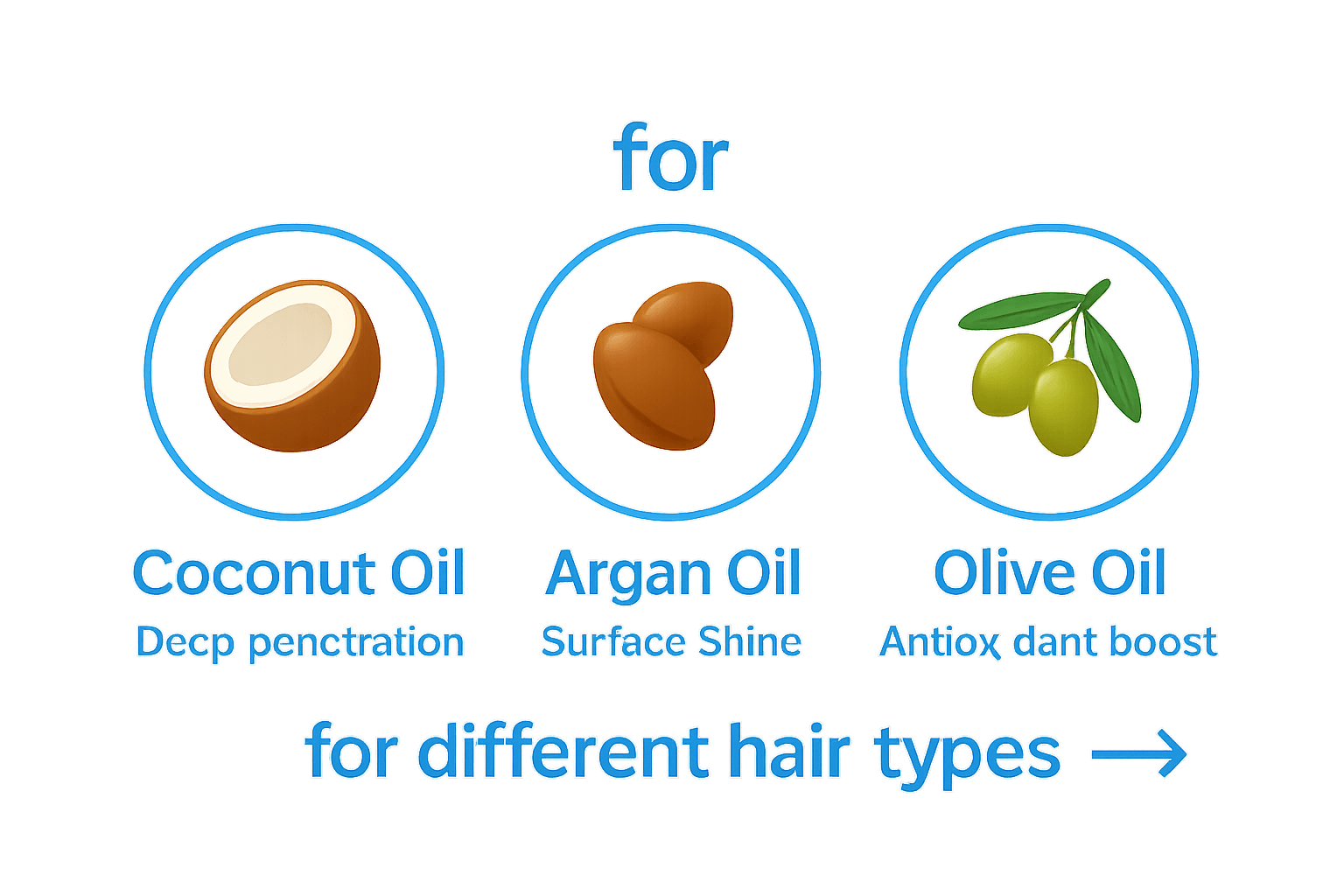Blog
Learning Materials
Understanding Organic Oil 2025: A Comprehensive Guide
Updated: September 18, 2025

Organic oils have become the top choice for anyone serious about better hair health. And people are not guessing about the benefits, either. Studies show that organic oils deliver far higher concentrations of antioxidants and essential nutrients than conventional hair oils. Most folks expect the big difference to come from complex ingredients or processing, but it actually comes down to how simply these oils are made. The real surprise is that skipping chemicals and sticking with pure plant extracts leads to stronger, healthier hair starting at the cellular level.
Table of Contents
- What Is Organic Oil And Its Role In Hair Care?
- Why Organic Oil Matters For Hair Health And Growth
- How Organic Oils Work For Different Hair Types
- Key Ingredients In Organic Oils And Their Benefits
- Emerging Trends In Organic Oil Use For 2025
Quick Summary
| Takeaway | Explanation |
|---|---|
| Organic oils benefit hair health significantly. | They are derived from plants, free of synthetic chemicals, and rich in nutrients that promote hair restoration and growth. |
| Personalized oil solutions target specific hair types. | Different organic oils provide unique benefits tailored to various hair structures, affecting their performance and nutritional delivery. |
| Key ingredients enhance follicle and scalp health. | Components like omega-3 fatty acids and Vitamin E strengthen hair and protect against damage, promoting robust growth. |
| Minimal processing preserves beneficial compounds. | Organic oils maintain a high concentration of bioactive substances due to their unrefined extraction processes, enhancing their effectiveness. |
| Future trends emphasize sustainability and technology. | Advances in extraction methods and personalization will shape organic oil usage, making hair care solutions more customized and eco-friendly. |
What is Organic Oil and Its Role in Hair Care?
Organic oils represent a specialized category of natural plant-derived substances extracted without synthetic chemicals or pesticides, offering profound benefits for hair health and restoration. These pure, minimally processed oils contain concentrated nutrients that interact directly with hair follicles and scalp environments.
Understanding Organic Oil Composition
Research from the International Journal of Molecular Sciences reveals that organic oils are distinguished by their exceptional phytochemical content and minimal chemical contamination. Unlike conventional oils, organic variants preserve more bioactive compounds that support hair growth and scalp health.
The key characteristics of organic oils include:
- High concentration of natural antioxidants
- Unrefined extraction processes
- Absence of synthetic chemical residues
- Rich nutritional profile from pure botanical sources
These oils work through multiple mechanisms to support hair health. They penetrate the hair shaft, reduce protein loss, and provide essential moisture that prevents breakage and promotes stronger, more resilient hair strands.
Organic Oils in Hair Care Strategies
Organic oils function as powerful natural interventions in hair care. They deliver targeted nutrition directly to hair follicles, helping address multiple hair health challenges simultaneously. By choosing organic options, users can access concentrated botanical extracts without unnecessary chemical additives.
For those interested in personalized hair growth solutions, our guide on fast hair growth oils provides comprehensive insights into selecting the most effective organic oil treatments for individual hair needs.
Beyond cosmetic benefits, organic oils represent a holistic approach to hair care that respects both personal health and environmental sustainability. Their natural composition ensures minimal risk of adverse reactions while delivering targeted nutritional support for optimal hair growth and maintenance.
The following table compares key differences between organic oils and conventional oils to help clarify why organic oils are regarded as superior for hair health within the article's context.
| Feature | Organic Oils | Conventional Oils |
|---|---|---|
| Extraction Method | Cold-pressed, unrefined, chemical-free | Often involves heat and chemical solvents |
| Chemical Residue | None; free of synthetic chemicals and pesticides | Possible presence due to farming or processing methods |
| Nutritional Content | High in natural antioxidants and bioactive compounds | Reduced by processing; may contain fillers |
| Hair Benefits | Enhanced restoration, cellular nutrition, and scalp health | Surface-level moisture, less support for hair growth |
| Risk of Irritation | Minimal, due to pure plant sources | Higher, due to potential chemical additives |
Why Organic Oil Matters for Hair Health and Growth
Organic oils have emerged as critical solutions for comprehensive hair health, offering more than superficial cosmetic benefits. Their unique molecular composition and minimal processing make them powerful natural interventions for addressing complex hair growth challenges.
Cellular Level Hair Nutrition
Research in the International Journal of Molecular Sciences demonstrates that organic oils deliver targeted cellular nutrition through their concentrated bioactive compounds. These natural extracts provide essential nutrients that penetrate hair follicles, supporting fundamental hair growth mechanisms.
Key nutritional advantages of organic oils include:
- Direct delivery of fatty acids to hair roots
- Antioxidant protection against environmental damage
- Cellular membrane strengthening
- Enhanced metabolic support for follicle health
By interacting directly with hair follicle cells, organic oils help create an optimal internal environment for robust hair growth and maintenance.
Holistic Hair Restoration Strategy
Organic oils transcend traditional hair care approaches by addressing multiple physiological factors simultaneously. They work synergistically to reduce inflammation, balance scalp microbiome, and provide comprehensive nutritional support.
Learn more about homemade hair oil treatments to understand how personalized organic oil solutions can transform your hair health approach.
The significance of organic oils extends beyond immediate cosmetic improvements. They represent a sustainable, scientifically-backed method of supporting long-term hair vitality by working in harmony with the body's natural regenerative processes. Unlike synthetic alternatives, organic oils offer a gentle yet potent approach to hair restoration that respects individual physiological differences.
How Organic Oils Work for Different Hair Types
Organic oils are not universal solutions but sophisticated, targeted interventions designed to address the unique characteristics of various hair types. Their effectiveness stems from intricate molecular interactions that respond differently to individual hair structures and scalp conditions.
Molecular Adaptation to Hair Structures
Research published in PubMed reveals how different organic oils interact uniquely with hair types, demonstrating remarkable specificity in their nutritional delivery and protective mechanisms.
Key mechanisms of organic oil interactions include:
- Molecular penetration depth varies by hair porosity
- Fatty acid composition determines nutritional impact
- Specific oils target different hair structural needs
- Antioxidant levels influence protective capabilities
These nuanced interactions mean that curly, straight, damaged, or color-treated hair will respond differently to various organic oil treatments.

Precision Targeting of Hair Concerns
Organic oils function as intelligent interventions, addressing specific hair challenges through their unique chemical compositions. Coconut oil, for instance, penetrates deeper into hair shafts, while lighter oils like argan provide surface-level protection and shine.
Discover coconut oil strategies for hair fall prevention to understand how targeted organic oil approaches can transform hair health.
The sophisticated nature of organic oils means they are not merely cosmetic solutions but advanced hair care technologies. By understanding the specific properties of different organic oils, individuals can craft personalized hair care strategies that respect their unique hair type and health requirements.
Key Ingredients in Organic Oils and Their Benefits
Organic oils are complex botanical extracts containing sophisticated molecular compositions that deliver targeted nutritional support for hair health. Understanding their key ingredients reveals the scientific precision behind their remarkable hair restoration capabilities.
Molecular Nutrition Profile
Research from the National Institutes of Health highlights the intricate nutritional landscape of organic oils, demonstrating how specific molecular components interact with hair and scalp biology.
Critical ingredients found in organic oils include:
- Omega-3 fatty acids for cellular membrane health
- Vitamin E as a powerful antioxidant
- Polyphenols supporting inflammation reduction
- Phytosterols promoting follicle strength
These ingredients work synergistically, creating a comprehensive approach to hair nutrition that goes beyond surface-level treatment.
Targeted Ingredient Functions
Each ingredient in organic oils serves a specific biological function. Omega-3 fatty acids strengthen cellular membranes, enabling better nutrient absorption. Vitamin E neutralizes free radicals, protecting hair follicles from oxidative stress. Polyphenols reduce scalp inflammation, creating an optimal environment for hair growth.

Explore olive oil benefits for hair growth to understand how specific ingredients contribute to hair health.
The precision of organic oil ingredients represents a scientific approach to hair care. By understanding these molecular components, individuals can select oils that precisely match their unique hair and scalp requirements, transforming hair care from a generic treatment to a personalized nutritional intervention.
This table summarizes the main active ingredients found in organic oils for hair care, along with their specific benefits, to reinforce the molecular approach discussed in the section.
| Ingredient | Function in Hair Care | Notable Benefits |
|---|---|---|
| Omega-3 Fatty Acids | Strengthen cellular membranes | Improve moisture retention, support hair elasticity |
| Vitamin E | Antioxidant protection | Shields follicles from damage, promotes healthy growth |
| Polyphenols | Anti-inflammatory action | Reduces scalp irritation, supports follicle health |
| Phytosterols | Follicle strengthening | Encourages thick, resilient hair |
Emerging Trends in Organic Oil Use for 2025
The organic oil landscape is undergoing significant transformation, driven by technological advancements, consumer awareness, and sophisticated scientific research. As we approach 2025, the convergence of personalized health technologies and sustainable practices is reshaping how individuals perceive and utilize organic oils.
Technological Integration and Personalization
Research from the OECD-FAO Agricultural Outlook indicates a projected 0.5% annual increase in vegetable oil consumption, highlighting the growing demand for specialized, targeted organic oil solutions.
Key emerging trends for organic oil use include:
- AI-driven personalized oil recommendations
- Increased focus on sustainable sourcing
- Advanced molecular extraction techniques
- Integration with precision health technologies
These trends signal a shift from generic product approaches to highly customized, scientifically backed interventions.
Sustainability and Technological Innovation
Organic oil development is moving beyond traditional boundaries, embracing cutting-edge technologies that enhance both product efficacy and environmental responsibility. Innovations in molecular extraction, precision agriculture, and biotechnology are enabling more targeted, efficient organic oil production.
Explore our latest hair growth solutions to understand how technological advancements are revolutionizing organic oil applications.
The future of organic oils represents a sophisticated intersection of scientific research, technological innovation, and personalized health strategies. By 2025, consumers can expect increasingly intelligent, targeted solutions that offer unprecedented levels of customization and effectiveness.
Ready for Personalized Organic Oil Results in 2025?
Many people today struggle to find organic oil solutions that truly work for their unique hair types. As highlighted in our article, the world of natural oils is advanced and complex. Not every oil fits every hair challenge, and navigating this landscape can be overwhelming. You want more than generic advice. You want real answers for your hair concerns, whether you have curly, straight, or thinning hair. Waiting for visible improvement can be frustrating if you do not have clear guidance tailored to your needs.

Let MyHair.ai take the guesswork out of your journey. Upload your hair scan to our secure platform and access AI-powered assessments that use modern research about organic oils for your specific hair structure. Get personalized recommendations backed by science so you do not waste time or money on products that do not fit. Are you ready to see real change? Visit MyHair.ai now and discover how our technology connects the power of organic oils with the future of personalized hair growth. Act now to start tracking your results and make every drop of oil count.
Frequently Asked Questions
What are organic oils and how are they different from regular oils?
Organic oils are natural plant-derived substances extracted without synthetic chemicals or pesticides. Unlike regular oils, organic oils retain more bioactive compounds that support hair growth and scalp health due to their unrefined extraction processes.
How do organic oils benefit hair health?
Organic oils deliver concentrated nutrients directly to hair follicles, providing moisture, reducing protein loss, and enhancing the overall health of the hair. They penetrate the hair shaft to support stronger, more resilient hair strands.
Can organic oils be used for all hair types?
Yes, organic oils can be tailored to meet the specific needs of different hair types. Depending on the oil's molecular composition, some may better suit curly, straight, damaged, or color-treated hair, allowing for customized hair care strategies.
What key ingredients should I look for in organic oils for hair care?
Look for ingredients like omega-3 fatty acids for cellular health, vitamin E for antioxidant protection, polyphenols to reduce inflammation, and phytosterols to promote follicle strength. These ingredients work together to support optimal hair growth and maintenance.